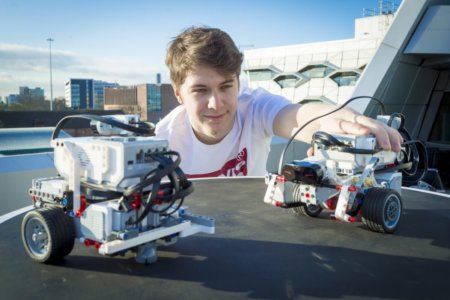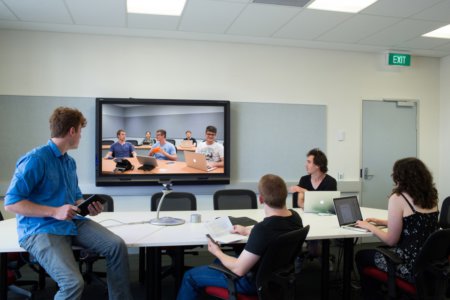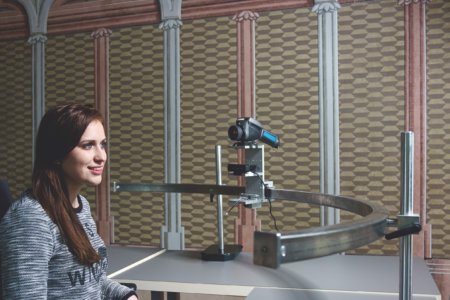
Computing is ubiquitous in our everyday lives. We use laptops, phones, social media, smart apps and websites without batting an eyelid. According to The Global Information Technology Report 2016, Innovating in the Digital Economy, “We are at the dawn of the Fourth Industrial Revolution, which represents a transition to a new set of systems, bringing together digital, biological, and physical technologies in new and powerful combinations.”
The most important aspect of computer science is problem solving, an essential skill for life. Taking up a degree in this field of study means exploring the design, development and analysis of software and hardware used to solve problems in a variety of business, scientific and social contexts. As computers solve problems to serve people, there is a significant human side to computer science as well.
Here are three UK universities that produce computer science graduates armed with the right knowledge, skills and experience to thrive in Industry 4.0:
University of Lincoln: School of Computer Science
Ranked in the top 250 in the world in the Times Higher Education (THE) World University Rankings 2021. Groundbreaking research, such as optimising the treatment of cancer patients and spearheading the development of next generation robots for agri-food production. Nearly two-thirds of staff publications rated “international quality” or “world leading” in the most recent external Research Assessment.
The above are a sampling of what set the University of Lincoln’s School of Computer Science apart. Ask graduates and you’ll hear many more reasons, from award-winning teaching to world-leading research and state-of-the-art facilities. As a result, many students evolve into graduates equipped with the necessary skills and mindset to work at the frontier of this dynamic discipline.
Their distinctive skill sets come from a range of opportunities offered by the University of Lincoln, such as work placements and extracurricular projects. As the School of Computer Science is a member of the Microsoft Imagine Academy and the Cisco Academy, you’ll have opportunities to gain industry recognised qualifications such as Microsoft Technology Associate and Cisco certification.
The university is also home to the world’s first Centre for Doctoral Training for agri-food robotics, which aims to develop the next generation of Robotics and Autonomous Systems specialists for the global food and farming sectors. Through the “student as producer” initiative, you will also be a part of cutting-edge research in robotics and autonomous systems, computer vision/imaging, games computing, VR/AR, data science/ML/AI, and human-computer interaction.
You’re set for an exciting, thriving, and expanding experience whichever programme you choose. The School of Computer Science offers a range of undergraduate and postgraduate programmes, including BSc (Hons) Computer Science, BSc (Hons) Games Computing, MSc Robotics and Autonomous Systems, MSc Cloud Computing, MSc Games Development and Design, and MSc Computer Science. To learn more about why current students love studying at Lincoln’s School of Computer Science, click here.
University of Edinburgh: School of Informatics
The University of Edinburgh has launched successful careers in different fields of technology. Graduates comfortably secure roles such as software engineer, hardware engineer, app developer, web developer, programmer, and so forth. They can be found in companies such as Google, Facebook, Amazon, IBM, SkyScanner, Intel and Samsung, among many others.

At Edinburgh, you’ll be taught by experts in software engineering, business and innovation, digital innovation, research methods and design. Source: University of Edinburgh
Edinburgh’s School of Informatics offers postgraduate computer science studies where students are trained in niche areas of computer science, becoming experts and changemakers in the field.
These degrees help students specialise in their area of interest while developing the technical and soft skills needed to succeed in the industry. The school provides a fertile environment for a wide range of studies focusing on understanding computation in both artificial and natural systems.
MSc programmes offered here include Advanced Technology for Financial Computing MSc, Artificial Intelligence MSc, Cognitive Science MSc, and Computer Science MSc, to name a few.
Computer Science MSc students forge specialist, advanced skills in the development, construction and management of advanced computer systems. The school’s expertise is recognised internationally, spanning the range from computer architecture through theoretical computer science.
You can also specialise in the design, analysis, implementation, and use of computer systems — these range from the components of a single processor to computer networks as vast as the Internet.
Students also earn practical experience and gain a thorough theoretical understanding of the field. The result? Boosting your employability to a wide range of employers or preparing you for further academic study.
Bangor University: School of Computer Science and Electronic Engineering
Founded in 1884, Bangor University brings students from all over the world together to experience outstanding learning standards. It is Top 10 in the UK for Student Satisfaction (Complete University Guide 2021).

Bangor University students learn from some of the nation’s best. Source: Bangor University
The university’s School of Computer Science and Electronic Engineering is equipped with top facilities. This includes computer and networking laboratories, a state-of-the art electronic laboratory, extensive research laboratories and a Class 1000 electronics cleanroom.
Here, students learn from some of the nation’s best — the school’s staff are world leaders in a broad range of technologies, from Data Visualisation to Artificial Intelligence and Pattern Recognition; Medical Microwave Electronics and Medical Simulation; Optoelectronics, Broadband and Optical Communications; Organic Electronics; Nanotechnology; Nuclear Engineering and more.
Their expertise is infused into programmes. You’ll also work closely with them as part of your undergraduate degree, through individual and team projects.
Abdullah, a BSc Computer Science student, says, “The best thing about the course is that we get to experiment with different technologies. We get to know about creating and programming games.”
Graduate Julian believes he made the right choice in selecting Bangor University’s BSc Computer Science. “The lecturers know who you are and they know your progress and what you’re good at and what you’re not good at,” he shares. “What I found is that it was sort of progressive teaching so in my first year it was quite similar to what I was used to at school and Sixth Form, but as some years went on, we became more and more independent.”
The setting for this dynamic learning? A region of natural beauty between the mountains, lakes and forests of the Snowdonia National Park and the dramatic North Wales coastline. At its doorstep is The Isle of Anglesey (Ynys Môn), making Bangor University the perfect environment to study. In 2017, it was voted one of the best locations in the world to visit by Lonely Planet.
*Some of the institutions featured in this article are commercial partners of Study International










